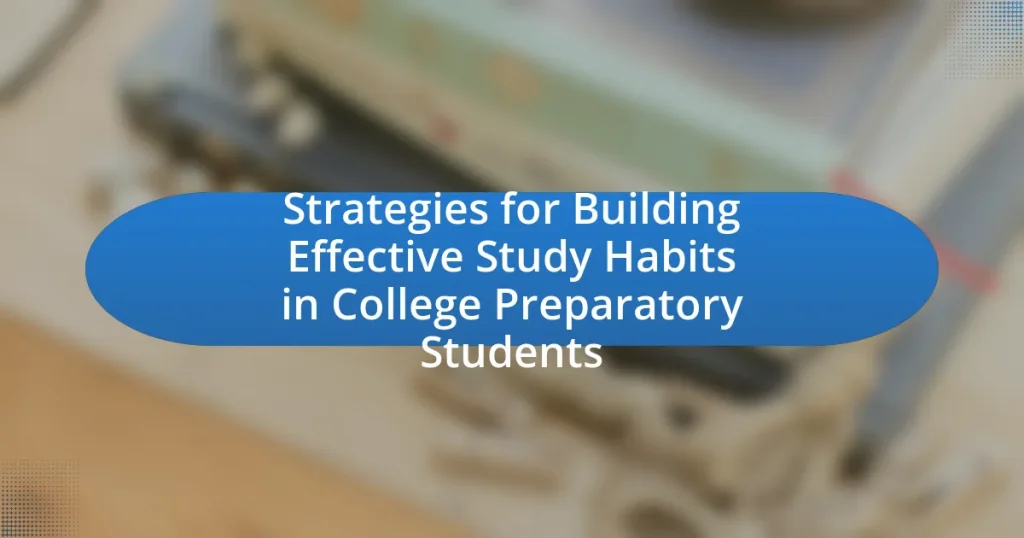The article focuses on strategies for building effective study habits in college preparatory students. It outlines essential practices such as setting specific goals, creating structured study schedules, and employing active learning techniques to enhance retention and understanding. The impact of study habits on academic performance, stress reduction, and college readiness is discussed, supported by research findings. Additionally, the article highlights practical tips for time management, creating optimal study environments, and utilizing technology and resources to support effective study routines. Overall, it emphasizes the importance of developing strong study habits early for long-term academic success.

What are Effective Study Habits for College Preparatory Students?
Effective study habits for college preparatory students include setting specific goals, creating a structured study schedule, and utilizing active learning techniques. Setting specific goals helps students focus their efforts and measure progress, while a structured study schedule promotes consistency and time management. Active learning techniques, such as summarizing information, teaching concepts to peers, and practicing retrieval through quizzes, enhance retention and understanding. Research indicates that students who employ these strategies tend to achieve higher academic performance, as evidenced by studies showing that structured study habits correlate with improved grades and test scores.
How do study habits impact academic performance?
Study habits significantly influence academic performance by determining how effectively students absorb and retain information. Consistent study routines, such as regular review sessions and active engagement with material, lead to better understanding and higher grades. Research indicates that students who employ effective study strategies, like spaced repetition and self-testing, achieve academic success at a higher rate. For instance, a study published in the journal “Psychological Science in the Public Interest” by Dunlosky et al. (2013) found that techniques like practice testing and distributed practice are among the most effective for enhancing learning and retention, directly correlating with improved academic outcomes.
What specific study habits are most beneficial for college preparatory students?
Effective study habits for college preparatory students include active engagement with the material, consistent scheduling, and the use of varied study techniques. Active engagement, such as summarizing information in one’s own words or teaching concepts to peers, enhances comprehension and retention. Consistent scheduling, which involves setting aside specific times for study sessions, helps establish a routine that promotes discipline and reduces procrastination. Additionally, employing varied study techniques, such as flashcards, practice tests, and group discussions, caters to different learning styles and reinforces understanding. Research indicates that students who utilize these habits tend to achieve higher academic performance, as evidenced by studies showing improved grades and test scores among those who actively engage with their studies and maintain a structured study schedule.
How can effective study habits reduce stress and anxiety?
Effective study habits can significantly reduce stress and anxiety by promoting organization and time management. When students establish a structured study schedule, they can allocate sufficient time for each subject, which minimizes last-minute cramming and the associated stress. Research indicates that students who use effective study techniques, such as spaced repetition and active recall, experience lower levels of anxiety because they feel more prepared for exams. A study published in the Journal of Educational Psychology found that students who engaged in regular study sessions reported a 30% decrease in anxiety levels compared to those who did not follow a consistent study routine. By fostering a sense of control over their learning process, effective study habits empower students to approach their academic responsibilities with confidence, thereby alleviating stress and anxiety.
Why is it important to develop study habits early?
Developing study habits early is crucial because it establishes a foundation for academic success and lifelong learning. Early study habits enhance time management, improve retention of information, and foster a disciplined approach to learning. Research indicates that students who cultivate effective study routines in their formative years tend to achieve higher academic performance, as evidenced by a study published in the Journal of Educational Psychology, which found that consistent study habits correlate with improved grades and reduced anxiety levels among students.
What are the long-term benefits of strong study habits?
Strong study habits lead to improved academic performance and lifelong learning skills. Students who develop effective study routines often achieve higher grades, which can enhance their opportunities for scholarships and college admissions. Research indicates that consistent study practices foster better retention of information, leading to a deeper understanding of subjects over time. Additionally, strong study habits cultivate critical thinking and problem-solving abilities, essential skills in both academic and professional settings. A study published in the Journal of Educational Psychology found that students with structured study habits scored significantly higher on standardized tests compared to their peers without such habits. This evidence underscores the importance of strong study habits in achieving long-term educational and career success.
How do study habits influence college readiness?
Study habits significantly influence college readiness by equipping students with essential skills for academic success. Effective study habits, such as time management, active learning, and consistent review, help students develop self-discipline and critical thinking, which are crucial for navigating college-level coursework. Research indicates that students who engage in structured study routines are more likely to achieve higher grades and adapt to the demands of higher education. For instance, a study published in the Journal of Educational Psychology found that students who utilized effective study strategies scored an average of 20% higher on assessments compared to those with poor study habits. This correlation underscores the importance of cultivating strong study practices to enhance college preparedness.

What Strategies Can Be Used to Build Effective Study Habits?
To build effective study habits, students should implement strategies such as setting specific goals, creating a structured study schedule, and utilizing active learning techniques. Setting specific goals helps students focus their efforts and measure progress, while a structured study schedule promotes consistency and time management. Active learning techniques, such as summarizing information, teaching concepts to others, and engaging in practice tests, enhance retention and understanding. Research indicates that students who employ these strategies demonstrate improved academic performance and greater retention of material, as evidenced by studies showing that structured study schedules can lead to a 20% increase in retention rates compared to unstructured approaches.
How can time management improve study habits?
Time management significantly improves study habits by enabling students to allocate specific time slots for studying, thereby enhancing focus and retention of information. When students prioritize their tasks and create structured schedules, they reduce procrastination and increase productivity. Research indicates that students who employ effective time management techniques, such as the Pomodoro Technique, report higher academic performance and lower stress levels. A study published in the Journal of Educational Psychology found that students who planned their study time effectively scored an average of 20% higher on exams compared to those who did not manage their time well. This demonstrates that organized time management directly correlates with improved study habits and academic success.
What techniques can students use to create a study schedule?
Students can use techniques such as prioritization, time blocking, and the Pomodoro Technique to create an effective study schedule. Prioritization involves identifying the most important tasks based on deadlines and exam dates, allowing students to focus on high-impact subjects first. Time blocking requires students to allocate specific time slots for studying different subjects or topics, which helps in maintaining a structured approach to learning. The Pomodoro Technique, which consists of studying for 25 minutes followed by a 5-minute break, enhances concentration and prevents burnout. Research indicates that structured study schedules improve academic performance by promoting consistent study habits and reducing procrastination.
How does prioritizing tasks enhance study effectiveness?
Prioritizing tasks enhances study effectiveness by allowing students to focus on the most important and time-sensitive assignments first. This approach minimizes procrastination and ensures that critical deadlines are met, leading to improved academic performance. Research indicates that students who prioritize their tasks are more likely to achieve higher grades, as they allocate their time and resources efficiently, reducing stress and increasing retention of information. A study published in the Journal of Educational Psychology found that students who utilized prioritization strategies reported better time management skills and higher levels of academic achievement.
What role does the study environment play in habit formation?
The study environment significantly influences habit formation by providing cues and context that reinforce specific behaviors. A well-structured study environment, characterized by minimal distractions, appropriate resources, and a conducive atmosphere, enhances focus and consistency, which are crucial for developing effective study habits. Research indicates that environmental factors, such as lighting, noise levels, and organization, can impact cognitive performance and motivation, thereby affecting the establishment of study routines. For instance, a study published in the Journal of Educational Psychology found that students who utilized designated study spaces reported higher levels of engagement and retention, demonstrating the importance of a supportive environment in habit formation.
How can students create an optimal study space?
Students can create an optimal study space by ensuring it is quiet, well-lit, and organized. A quiet environment minimizes distractions, which is crucial for maintaining focus; studies show that noise can significantly impair cognitive performance. Adequate lighting, preferably natural light, reduces eye strain and enhances mood, contributing to better concentration. An organized space, with all necessary materials within reach, allows for efficient study sessions, as clutter can lead to increased stress and decreased productivity. Research indicates that a dedicated study area can improve academic performance by fostering a routine and signaling to the brain that it is time to focus.
What distractions should be minimized for better focus?
To achieve better focus, distractions such as mobile phone notifications, social media, background noise, and multitasking should be minimized. Research indicates that frequent interruptions from mobile notifications can reduce productivity by up to 40%, as reported by the University of California, Irvine. Additionally, social media platforms can lead to significant time loss and decreased concentration, with studies showing that students who frequently check social media while studying score lower on academic assessments. Background noise, particularly in shared environments, can hinder cognitive performance, as demonstrated by a study from the Journal of Experimental Psychology, which found that noise can impair memory and attention. Lastly, multitasking has been shown to decrease efficiency and increase errors, with a study from Stanford University revealing that multitaskers perform worse on tasks requiring focus compared to those who concentrate on one task at a time.

What Tools and Resources Support Effective Study Habits?
Effective study habits are supported by tools and resources such as digital planners, study apps, and online educational platforms. Digital planners like Todoist and Notion help students organize tasks and deadlines, enhancing time management. Study apps such as Quizlet and Anki facilitate active recall and spaced repetition, which are proven techniques for improving memory retention. Online educational platforms like Khan Academy and Coursera provide access to a wide range of subjects and resources, allowing students to learn at their own pace. Research indicates that utilizing these tools can lead to improved academic performance and better retention of information, as they align with cognitive science principles.
How can technology aid in developing study habits?
Technology aids in developing study habits by providing tools that enhance organization, facilitate access to resources, and promote engagement. Digital planners and apps like Todoist or Notion help students schedule study sessions and track assignments, improving time management. Online resources such as Khan Academy and Quizlet offer interactive learning materials that cater to various learning styles, making study sessions more effective. Additionally, platforms like Google Classroom enable collaboration and communication among peers and instructors, fostering a supportive learning environment. Research indicates that students who utilize technology for study purposes report higher levels of motivation and academic performance, demonstrating its effectiveness in cultivating productive study habits.
What apps are recommended for time management and organization?
Recommended apps for time management and organization include Todoist, Trello, and Notion. Todoist allows users to create tasks, set deadlines, and prioritize work, making it effective for managing study schedules. Trello utilizes boards and cards to visually organize projects and tasks, which can enhance productivity for students. Notion combines note-taking, task management, and database features, providing a comprehensive tool for organizing study materials and schedules. These apps are widely recognized for their user-friendly interfaces and effectiveness in helping users manage their time and tasks efficiently.
How can online resources enhance learning and retention?
Online resources enhance learning and retention by providing accessible, diverse, and interactive materials that cater to various learning styles. These resources, such as educational videos, interactive quizzes, and online forums, facilitate engagement and active participation, which are critical for effective learning. Research indicates that multimedia learning environments can improve retention rates by up to 60% compared to traditional methods, as they allow students to visualize concepts and apply knowledge in real-time. Additionally, platforms like Khan Academy and Coursera offer personalized learning paths, enabling students to progress at their own pace, further solidifying their understanding and memory retention.
What are some common challenges in building study habits?
Common challenges in building study habits include lack of motivation, poor time management, and distractions. Lack of motivation can stem from unclear goals or overwhelming material, making it difficult for students to engage with their studies. Poor time management often results from underestimating the time required for tasks, leading to procrastination and last-minute cramming. Distractions, such as social media and environmental noise, can significantly hinder focus and productivity. Research indicates that students who struggle with these challenges are less likely to develop effective study routines, which can negatively impact their academic performance.
How can students overcome procrastination?
Students can overcome procrastination by implementing structured time management techniques. Establishing a clear schedule with specific deadlines helps students prioritize tasks and allocate time effectively. Research indicates that students who use time management strategies, such as the Pomodoro Technique, which involves working in focused intervals followed by short breaks, report increased productivity and reduced procrastination. Additionally, setting achievable goals and breaking larger tasks into smaller, manageable steps can enhance motivation and decrease feelings of overwhelm, further aiding in the reduction of procrastination behaviors.
What strategies can help maintain motivation and consistency?
Setting specific, achievable goals is a key strategy to maintain motivation and consistency. Research indicates that students who set clear, measurable objectives are more likely to stay focused and committed to their study routines. For instance, a study published in the Journal of Educational Psychology found that students who utilized goal-setting techniques improved their academic performance by 20% compared to those who did not. Additionally, incorporating regular self-assessment and reflection helps students track their progress, reinforcing their motivation to continue. Establishing a consistent study schedule also plays a crucial role, as it creates a structured environment that fosters discipline and reduces procrastination.
What are the best practices for sustaining effective study habits?
The best practices for sustaining effective study habits include establishing a consistent study schedule, creating a conducive study environment, and utilizing active learning techniques. A consistent study schedule helps students allocate specific times for studying, which reinforces routine and discipline. Research indicates that students who study at the same time each day are more likely to retain information (Pashler et al., 2007, Psychological Science in the Public Interest).
Creating a conducive study environment minimizes distractions and enhances focus, as studies show that a dedicated study space can improve concentration and productivity (Karpicke & Blunt, 2011, Science). Active learning techniques, such as summarizing information, teaching concepts to others, and engaging in practice tests, have been proven to enhance understanding and retention of material (Roediger & Butler, 2011, Perspectives on Psychological Science).
Incorporating these practices can significantly improve the effectiveness of study habits among college preparatory students.
How can students regularly assess and adjust their study habits?
Students can regularly assess and adjust their study habits by implementing self-reflection techniques and utilizing performance metrics. Self-reflection involves students reviewing their study sessions to identify what strategies worked effectively and which did not, allowing them to make informed adjustments. Performance metrics, such as tracking grades, test scores, and completion rates of assignments, provide concrete data that students can analyze to determine the effectiveness of their study habits. Research indicates that students who engage in regular self-assessment and adjust their strategies based on performance data tend to achieve higher academic success, as evidenced by a study published in the Journal of Educational Psychology, which found that self-regulated learners significantly outperformed their peers in academic settings.
What role does self-reflection play in improving study techniques?
Self-reflection plays a crucial role in improving study techniques by enabling students to assess their learning processes and identify areas for enhancement. Through self-reflection, students can evaluate what study methods are effective and which ones are not, allowing them to make informed adjustments to their strategies. Research indicates that self-reflection fosters metacognitive awareness, which is essential for effective learning; for instance, a study published in the Journal of Educational Psychology found that students who engaged in self-reflection demonstrated higher academic performance due to improved self-regulation and strategy adaptation. This evidence underscores the importance of self-reflection in refining study techniques and promoting academic success.
What practical tips can students implement to enhance their study habits?
Students can enhance their study habits by implementing structured time management techniques. For instance, using the Pomodoro Technique, which involves studying for 25 minutes followed by a 5-minute break, can improve focus and retention. Research indicates that this method can increase productivity by up to 25% compared to traditional study sessions. Additionally, creating a dedicated study space free from distractions helps maintain concentration, as studies show that environmental cues significantly impact learning efficiency. Regularly reviewing material through active recall and spaced repetition further solidifies knowledge retention, with evidence suggesting that spaced repetition can enhance long-term memory by 50%.


